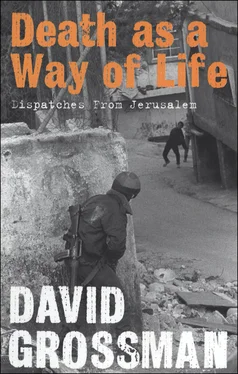David Grossman - Death as a Way of Life
Здесь есть возможность читать онлайн «David Grossman - Death as a Way of Life» весь текст электронной книги совершенно бесплатно (целиком полную версию без сокращений). В некоторых случаях можно слушать аудио, скачать через торрент в формате fb2 и присутствует краткое содержание. Год выпуска: 2013, Издательство: Bloomsbury Publishing, Жанр: Прочая документальная литература, на английском языке. Описание произведения, (предисловие) а так же отзывы посетителей доступны на портале библиотеки ЛибКат.
- Название:Death as a Way of Life
- Автор:
- Издательство:Bloomsbury Publishing
- Жанр:
- Год:2013
- ISBN:нет данных
- Рейтинг книги:5 / 5. Голосов: 1
-
Избранное:Добавить в избранное
- Отзывы:
-
Ваша оценка:
- 100
- 1
- 2
- 3
- 4
- 5
Death as a Way of Life: краткое содержание, описание и аннотация
Предлагаем к чтению аннотацию, описание, краткое содержание или предисловие (зависит от того, что написал сам автор книги «Death as a Way of Life»). Если вы не нашли необходимую информацию о книге — напишите в комментариях, мы постараемся отыскать её.
Death as a Way of Life — читать онлайн бесплатно полную книгу (весь текст) целиком
Ниже представлен текст книги, разбитый по страницам. Система сохранения места последней прочитанной страницы, позволяет с удобством читать онлайн бесплатно книгу «Death as a Way of Life», без необходимости каждый раз заново искать на чём Вы остановились. Поставьте закладку, и сможете в любой момент перейти на страницу, на которой закончили чтение.
Интервал:
Закладка:
Yet there is today a good chance of resolving all these issues in negotiations. The Clinton framework plan, which proposes solutions for all of them, has been accepted, in practice, by both sides, even if neither side is able to commence negotiations to put those solutions into practice. But if these demands are not met and are not resolved in negotiations, the Palestinians will continue to fight. In fact, they may even fight more fiercely if they feel that their terrorism has forced Israel into a new ghetto. They will, in fact, be rewarded for terrorism and have an incentive to continue it.
Because it is so important, let me say it again: The establishment of a fence without an agreement means that Israel would give up most of the occupied territories without the Palestinians giving up the right of return.
Furthermore, the establishment of a fence without peace also means that most of the settlements would be included within Israel. But in building the fence in such a way that they are on the Israeli side, Israel would also have to take in a large number of Palestinian towns and villages that lie close to these Israeli settlements and to the roads that lead to them. According to some estimates, this would involve the “annexation” of about 150,000 Palestinians. If we add in the Arabs of East Jerusalem, the number of Palestinians on the Israeli side of the fence may well reach 400,000. These people would not, of course, be Israeli citizens. Israel, after all, does not want them. They would have no clear legal status. Obviously, they would not be able to participate in elections. What, then, would be done with them? How, for example, would Israel pay for their social insurance? (Israel paid for it during its period of military rule and it cost hundreds of millions of dollars a year.) Does anyone seriously believe that these Palestinians would not become a new incubator for terror of an even more violent and desperate kind? When that happens, they would be inside the fence, not outside it, and they would have unobstructed passage to Israel’s city centers. Or would Israel confine them behind yet another, second fence? Israel fears the right of return, because it threatens to return several tens of thousands of Palestinians to within its borders. So it is impossible to understand how Israel could so easily be prepared to take in hundreds of thousands of hostile Palestinians by building a fence.
Another question. Has anyone given thought to how Israel’s million Arab citizens would react? Those whose wide-ranging ties with their families in the Palestinian Authority would be severed by the fence? Would Israel not be increasing the bitterness and frustration they feel, and would not this lead them to adopt even more extreme positions (and this at a time when their connection with their country, Israel, has been growing more tenuous)?
So, when we examine the issue, we reach the conclusion that the fence’s major drawing power for most Israelis is that, unlike other ideas being floated right now, it is one that has never actually been tried. So it can be believed in, for a while.
The borderline between Israel and Palestine can be set only through full agreement by both sides. Dialogue, as difficult as it may be, has tremendous importance in shaping the nature of the peace to come. Dialogue also contributes to the political maturation of its partners. True, an agreement seems detached from reality today, but even if it is hard to believe in, we cannot allow ourselves the luxury of despairing of it. I think it’s even better to wait and live for a few more years without this fence of illusions than to be tempted to build it now. It won’t, after all, put an end to terrorism, but only make perpetrators seek other ways to attack, perhaps more vicious ones. Even worse, the unilateral erection of a fence (it would really be better termed a wall) would be a move that would declare our absolute and final despair of reaching a peace agreement in our generation, of integrating a normal Israel into the region around it. In other words, the establishment of the fence may make the conflict permanent and push any possibility of a solution beyond reach.
Too many unilateral moves have been made here. Too many acts of political and military force and coercion. The unilateral establishment of a wall will bring a new and dangerous nadir in this process. A wall would allow the extremists — who are all too numerous — to argue that there would be no one to talk to in the future, either. A wall would allow stereotypes to take root and flourish in the minds of both peoples. Xenophobic and racist thinking would spread even more. Putting the Other out of sight will not solve the problem. It will only make dehumanization easier, and justify a more extreme struggle against that Other.
So, instead of being tempted by dubious ideas like the establishment of a border and the unilateral erection of a wall, it would be better for Israel to invest its energy in the immediate recommencement of negotiations. If Arafat is unacceptable to Sharon and Bush, let those leaders explain to us how they can create a better situation, and how they can assure us — if one could be reassured by such a thing — that Arafat’s successor will agree to accept their dictates. Until they can do so, they bear the responsibility, no less weighty than Arafat’s responsibility, for the immobility, the insensibility, and the despair on both sides, and for the continued violence and killing.
Two Years of Intifada
September 2002
On the second anniversary of the Intifada, Arafat was under Israeli siege for the second time; terrorist attacks on Israeli civilians inside Israel and in the occupied territories continued, keeping Israeli security forces on constant high alert; the sides were not negotiating a cease-fire; and President Bush was busy building a coalition for an attack on Iraq, planned to take place sometime in the near future.
I might begin this piece on the second anniversary of the second Intifada precisely two years ago, with the day when Ariel Sharon made his entry into the Temple Mount, on September 28, 2000, and set off a conflagration in the occupied territories. But the story could actually begin in any of the seven years that preceded September 2000. During that period, Israel and the Palestinians did everything in their power to disrupt and confound the delicate agreement they cobbled together at Oslo. Israel doubled the number of its settlers in the territories, and the Palestinians smuggled in weapons, hoarded ammunition, and prepared for war.
Those who were attentive then to the Palestinians’ complaints and warnings about the Oslo agreement and the reality it was supposed to make permanent could have seen something was amiss. It offered the Palestinians a tiny state, sliced into segments by a massive Israeli presence. More than anything else, this reality served Israel’s stringent security needs. The prescient could have understood then what had to happen.
Few in Israel were capable of listening to the warnings. That is our, the Israelis’, historic mistake. The Palestinians themselves joined in the march of folly by responding to Sharon’s provocation with an outbreak of unrestrained violence. What happened next is already history, and a tragedy. Two years have gone by. Two years of unlived life for both peoples. Two years of living with our senses, our reason for living, our habits, our hopes dulled and constricted. Two years of gradually congealing thought that could be expressed only in large red headlines.
More than 625 Israelis have been killed in a total of 14,280 incidents in these past two years. Some 1,370 Palestinians have been killed by Israeli military forces. A total of 4,500 Israelis have been injured in terrorist attacks, and among the Palestinians, the numbers are much higher — the Palestinian Red Crescent organization reported two weeks ago a total of 19,649 wounded.
Читать дальшеИнтервал:
Закладка:
Похожие книги на «Death as a Way of Life»
Представляем Вашему вниманию похожие книги на «Death as a Way of Life» списком для выбора. Мы отобрали схожую по названию и смыслу литературу в надежде предоставить читателям больше вариантов отыскать новые, интересные, ещё непрочитанные произведения.
Обсуждение, отзывы о книге «Death as a Way of Life» и просто собственные мнения читателей. Оставьте ваши комментарии, напишите, что Вы думаете о произведении, его смысле или главных героях. Укажите что конкретно понравилось, а что нет, и почему Вы так считаете.












